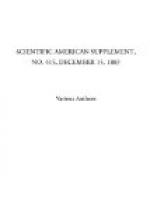“Some phthisical sufferers, of whom there are here, alas! too many, were now admitted from time to time into St. Vincent’s Hospital. They were admitted in all stages, from an early one to the most advanced. On each admission the case was carefully examined; the history, symptoms, and physical signs were exactly noted; and the patient was weighed on a stage balance with great accuracy. The patient was put as much as possible on the mullein treatment only. For obvious reasons, no cod-liver oil, koumiss, or other weight producer was given; the patients got the diet suitable to such sufferers; and, if the special symptoms became troublesome, received appropriate treatment. As much as possible, however, they were left to the mullein—a proceeding which was entirely satisfactory to themselves. In addition to the admission weighing, they were carefully weighed every week, and care was taken that this should be done as nearly as possible on the same day and hour, with the same clothes, and, in fact, as much as could be under the same conditions. In securing this the patients anxiously co-operated; and it was frequently amusing, but sometimes painful, to watch the satisfaction or chagrin with which the weekly result was received. I must here tender my acknowledgments to our zealous, attentive, and accurate house surgeon, Mr. Denis P. Kenna, by whom this important, but tedious, duty was discharged.”
Dr. Quinlan then refers to several cases, in which the mullein plant has been tried as a remedy for consumption, and remarks that these cases, although too few to justify any general conclusion, appear to establish some useful facts. The mullein plant boiled in milk is liked by the patients; in watery infusion it is disagreeable, and the succus is still more so. The hot milk decoction causes a comfortable (what our Gallic neighbors call pectorale) sensation, and when once patients take it they experience a physiological want, and when the supply was once or twice interrupted, complained much in consequence. That it eases phthisical cough there can be no doubt; in fact, some of the patients scarcely took their cough mixtures at all—an unmixed boon to phthisical sufferers with delicate stomachs. Its power of checking phthisical looseness of the bowels was very marked, and experiment proved that this was not merely due to the well known astringent properties of boiled milk. It also gave great relief to the dyspnoea. For phthisical night sweats it is utterly useless; but these can be completely checked by the hypodermic use of from one-eighteenth to one-fiftieth of a grain of the atropia sulphate; the smaller dose, if it will answer, being preferable, as the larger causes dryness of the pharynx, and interferes with ocular accommodation. In advanced cases, it does not prevent loss of weight, nor am I aware of anything that will, except koumiss. Dr. Carrick, in his interesting work on the koumiss treatment of Southern Russia (page 213), says:




